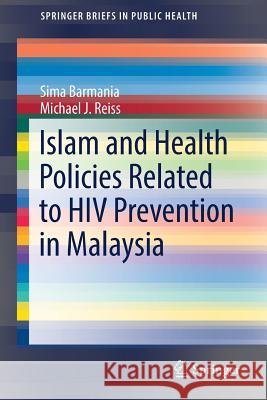Islam and Health Policies Related to HIV Prevention in Malaysia » książka



Islam and Health Policies Related to HIV Prevention in Malaysia
ISBN-13: 9783319689081 / Angielski / Miękka / 2017 / 95 str.
Islam and Health Policies Related to HIV Prevention in Malaysia
ISBN-13: 9783319689081 / Angielski / Miękka / 2017 / 95 str.
(netto: 191,66 VAT: 5%)
Najniższa cena z 30 dni: 192,74
ok. 16-18 dni roboczych.
Darmowa dostawa!
Wydanie ilustrowane
Chapter 1: Context
Sima Barmania, B Med Sci, MBBS, MPH, PhD, is a British medical doctor in global health, based between London, United Kingdom and Kuala Lumpur, Malaysia. She is a freelance writer, consultant, and an honorary research associate at UCL Institute of Education in London, UK. She qualified in medicine from Queen Mary University of London with an intercalated degree in community health sciences and undertook her Master's in Public Health from London School of Hygiene and Tropical Medicine. She completed her PhD in 2016 at United Nations University - Institute for Global Health, in collaboration with the National University of Malaysia, where her doctoral research explored the role of Islam in shaping HIV prevention in Malaysia. She is interested in the interface between public health, religion, and culture as well as broader interests spanning reproductive and mental health, and public health advocacy. Having had a long-running blog in the Independent, she also writes freelance for The Lancet medical journal and other media outlets. Her interests also include spirituality, world religions, and interfaith and peace education.
A former director of Education at the Royal Society, the inaugural editor of the academic journal Sex Education, and former specialist adviser to the House of Commons Education Committee PSHE (Personal, Social and Health Education) Inquiry, he is also a priest in the Church of England and president of the International Society for Science and Religion. His research and consultancy interests are in science education, bioethics, and sex education.
Books of his include: Abrahams, I. & Reiss, M. J. (Eds) (2017) Enhancing Learning with Effective Practical Science 11-16, Bloomsbury; Reiss, M. J. & White, J. (2013) An Aims-based Curriculum, IOE Press; Jones, A., McKim, A. & Reiss, M. (Eds) (2010) Ethics in the Science and Technology Classroom: A New Approach to Teaching and Learning, Sense; Jones, L. & Reiss, M. J. (Eds) (2007) Teaching about Scientific Origins: Taking Account of Creationism, Peter Lang; Braund, M. & Reiss, M. J. (Eds) (2004) Learning Science Outside the Classroom, RoutledgeFalmer; Levinson, R. & Reiss, M. J. (Eds) (2003) Key Issues in Bioethics: A Guide for Teachers, RoutledgeFalmer; Halstead, J. M. & Reiss, M. J. (2003) Values in Sex Education: From Principles to Practice, RoutledgeFalmer; Reiss, M. J. (2000) Understanding Science Lessons: Five Years of Science Teaching, Open University Press; Chapman, J. L. & Reiss, M. J. (1999). Ecology: Principles and Applications, Cambridge University Press; Reiss, M. J. & Mabud, S. A. (Eds) (1998) Sex Education and Religion, The Islamic Academy; Reiss, M. J. & Straughan, R. (1996). Improving Nature? The Science and Ethics of Genetic Engineering, Cambridge University Press; Reiss, M. J. (1993) Science Education for a Pluralist Society, Open University Press; King, A. & Reiss, M. J. (Eds) (1993) The Multicultural Dimension of the National Curriculum, Falmer Press; and Reiss, M. J. (1989) The Allometry of Growth and Reproduction, Cambridge University Press.
This salient text presents a culturally aware public health approach to the HIV epidemic in Malaysia, a country emblematic of the Muslim world's response to the crisis. It explores complex interactions of religion with health as a source of coping as well as stigma and denial, particularly as Islam plays a central role in Malaysian culture, politics, and policy. At the heart of the book, a groundbreaking study analyzes attitudes and behaviors toward prevention among diverse people living with HIV, faith leaders, and government health officials. From these findings, readers gain insight into how health professionals, policymakers, and organizations can create appropriate prevention programs in Malaysia, with implications for other Muslim countries.
This timely volume:
- Situates Malaysia and the Asian Pacific region in the context of the HIV epidemic.
- Analyzes ways Islamic beliefs can shape perceptions of HIV and prevention policy.
- Reviews a unique study of stakeholder opinions and practices regarding HIV.
- Discusses the consequences of Islamic rulings on sex outside marriage.
- Offers recommendations for effective HIV prevention practice and policy.
Islam and Health Policies Related to HIV Prevention in Malaysia is of immediate relevance to researchers studying HIV prevention, social aspects of religion, sexuality, and sex education. Policymakers in health promotion and health education as well as graduate students in sex education, sociology, psychology, and cultural studies should also find it useful.
1997-2026 DolnySlask.com Agencja Internetowa
KrainaKsiazek.PL - Księgarnia Internetowa









